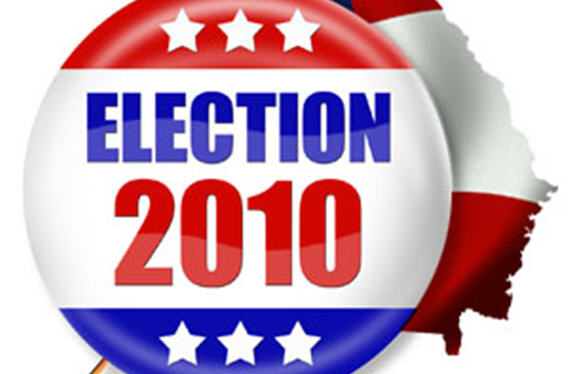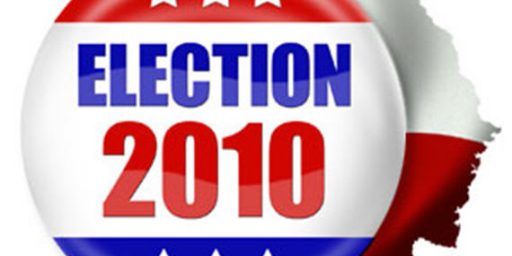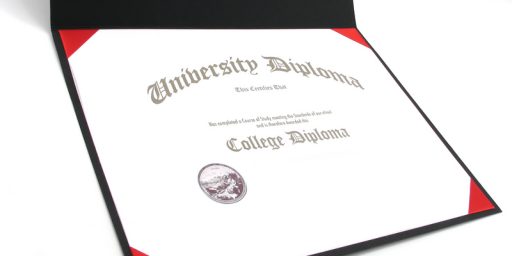The 2010 Midterms: A View From Across The Pond
The British press takes a look at America's Midterm Elections.
While Americans head to the polls, the Europeans, specifically Brits, who seemed to welcome Barack Obama’s election in 2008 are already trying to digest the idea that American voters are seemingly on the verge of handing him a massive political defeat.
Over at the BBC, Mark Mardell wonders whether the elections are a verdict on Obama:
The myriad of individual elections are going to be seen as a referendum on his first two years in office. The 37 governorships, 37 Senate seats and all 435 seats in the House of Representative are important in themselves, of course – some more than others. But many votes cast will be a verdict on Obama.
With high unemployment and a lacklustre recovery, all the opinion polls suggest Republicans will take control of the House and have a chance of taking the Senate, as well. In other words, the result of the referendum on Obama will almost certainly be “no”. But what was the question?
Was it “has he done enough” or “should he be president”? Or was it perhaps “has he improved your life” or “should he abandon his policies”?
It’s hard to say. But if the opinion polls are right, it may be that we have already seen the extent of what Mr Obama can do in office.
A harsh view indeed, but I can’t say it’s an inaccurate assessment. If the GOP does achieve the gains that have been forecast, then it will be seen as a clear rebuke of the President and his agenda, even if that isn’t entirely accurate. Moreover, the existence of a GOP-controlled House and, at the very least, a Senate with a much smaller Democratic majority, will make it next-to-impossible for the President to accomplish much more of his domestic agenda without significant compromises, assuming compromise is even possible at this point.
Over at the left-leaning Guardian, meanwhile, Ed Pilkington focuses on the midterms as a referendum on the Tea Party and, specifically, Christine O’Donnell:
Even if she loses, the memory of Christine O’Donnell’s fantastical bid for a Senate seat will endure. It has spoken volumes about the state of America, a country that is now so agitated and irritable that it could throw up such a whimsical candidate for the highest office within the party of Abraham Lincoln.
It has also spoken volumes about the impact on the US political process of the Tea Parties, that groundswell of volatile rightwing anger that in two short years has turned the audacious hope of Barack Obama on its head. You would have thought that Tea Party leaders might be a little sheepish today about having helped to build up a candidate who is almost certain to lose.
Not a bit of it.
“We don’t regret endorsing her whatsoever,” said Amy Kremer, president of the Tea Party Express, one of the most powerful Tea Party affiliations that backed O’Donnell in her primary run for the Republican nomination with hundreds of thousands of dollars.
Jenny Beth Martin, a leader of the Tea Party Patriots, said she too had no regrets that in that race O’Donnell had defeated Mike Castle, a moderate Republican who most observers believe would have had a far greater chance of taking the seat. “Yes, Mike Castle may have won, but what would have been the point of that if all he did was to vote for higher taxes and bigger government, just like the Democrats?”
The issue is not academic. Should the Republicans storm the country in the elections, as some think they might, they will have a shot at passing the magical number of 50 Senate seats needed to snatch the majority from the Democrats. That holds the prospect of Christine O’Donnell going down in history as the woman who cost the Republicans the Senate.
“The chances of the Republicans getting the numbers that they needed was set back very badly when O’Donnell was nominated,” said Ross Baker, an expert on Senate politics at Rutgers University.
While I agree with Pilkington that O’Donnell is unlikely to fade away in conservative circles anytime soon despite the fact that she could end up being the woman who costs the GOP control of the Senate, I’m not sure that she’s going to be the star that some think. Yes, she’s good looking and, yes, she gets the Tea Party crowds cheering with her (rather simplistic) rhetoric, but unlike Sarah Palin she has absolutely no political experience and a loss today would constitute her third loss in a row. She may show up as a commentator on Fox News Channel, in fact I expect it, but she’s never going to be the kind of powerhouse Sarah Palin has become.
In the Telegraph, meanwhile, Damien Thompson takes note of the fact that Americans on the left aren’t exactly in a good mood today:
The liberal residents of Manhattan and Brooklyn aren’t looking forward to the midterm results tonight. Many of them have only just recovered from their Halloween partying and are still trying to shrug off that lingering post-hangover depression. The New York Times is bravely trying to raise their spirits, pointing out that midterm defeats don’t stop presidents being handsomely re-elected. So that’s a straw progressive voters can cling on to, however bad the news. But will they be rushing to election-night parties? You must be kidding. Maybe they’ll head off to a bar to watch the results and let out a lukewarm cheer when Andrew Cuomo is elected governor or the Democrats fail to lose their Senate majority. Then again, they could do with an early night after the weekend.
In a trendy bar in SoHo, a young writer told me that some of his friends in New Hampshire were so revolted by the antics of the Tea Partiers that “they just don’t see any alternative to moving to Manhattan, an island of sanity”. Well, good luck with that, because it’s also an island of astronomical rents. Still, if they’ve got a couple of million dollars to spare, some of those brownstone apartments are fetching significantly less than they were before the financial crisis. New York may be insulated from the icy winds blowing down Main Street, but in some quarters there’s serious anxiety about Wall Street’s long-term health.
(…)
And, he adds – but in a low voice, because you have to be careful about dissing Barack Obama in SoHo – the uncertainty isn’t helped by the fact that the President increasingly strikes even sympathetic voters as a remote and elusive figure. Belief in his powers is patchy, even in Manhattan. Wealthy psychologists on the Upper West Side think he’ll outwit a hostile Congress as masterfully as he pushed through healthcare reform (or, at least, the one I met yesterday thought that). And radical students who rallied for Obama in 2008 were on the streets of the East Village yesterday trying to revive the spirit of two years ago. The pedestrians didn’t give their flyers a second glance. Too hung over, perhaps.
This is probably not an inaccurate assessment of the attitude among Democrats, especially those who were most invested in the President’s election two years ago, as evidenced by the enthusiasm gap that has been noted by pollsters since the summer. If nothing else, it’s clear that we Americans are once again confounding the Europeans.







I’m flattered, but three British outlets does not constitute a real assessment of what “Europe” thinks.
Well, if someone will play for the plane fare and hotel bill I’ll come on over and interview every single resident of the continent. No matter how long it takes 🙂
I have a couple of hundred sitting around, why not 🙂
My complaint was more that Britain is very unrepresentative. Your post is really about Britain’s reaction to the elections and says nothing about the others. What I’ve found more interesting is how little impact the election actually seems to be having, at least compared to 04, 06 and 08…
Fair enough point. I made a small change in the opening paragraph to reflect that this is specifically a look at British reaction